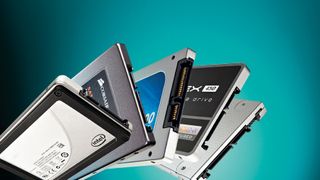Planning to buy an SSD? You absolutely must read this
New survey finds that SSD failure rates are increasing

A new survey from data recovery firm Kroll Ontrack has found that SSDs suffer from a worryingly high failure rate.
The research, which encompassed some 1,850 customers across North America, Europe and Asia, found that 92% were using SSDs now, but the number reporting failures had grown.
Almost four in 10 – 38% of respondents – said they had encountered a failure with an SSD. And as a result of those failures, 23% were unfortunate enough to have lost data.
Robin England, senior research and development engineer at Kroll Ontrack, commented: "While adoption of SSD is up and failure rates between SSD and HDD are consistent, the types of failure are generally different. With hard drives, a bad motor or scratch in the platter can cause failure. Because there are no moving parts in SSDs, general electric failure or wear levelling failure are more common."
Error evidence
Earlier this year, research from Google found that compared to hard disks, SSDs had a significantly lower replacement rate, but on the other hand, they also experienced a considerably higher rate of uncorrectable errors. Over 20% of SSDs develop uncorrectable errors over a four-year period according to Google.
The Kroll Ontrack study also found that there is increased demand for hybrid SSD disks (SSHD – traditional hard disks with an SSD cache) along with helium drives, adoption of which went up 2% in both cases.
SSHD adoption is now at 23%, although helium drives are still only at 3% in terms of their global uptake.
Are you a pro? Subscribe to our newsletter
Sign up to the TechRadar Pro newsletter to get all the top news, opinion, features and guidance your business needs to succeed!
Darren is a freelancer writing news and features for TechRadar (and occasionally T3) across a broad range of computing topics including CPUs, GPUs, various other hardware, VPNs, antivirus and more. He has written about tech for the best part of three decades, and writes books in his spare time (his debut novel - 'I Know What You Did Last Supper' - was published by Hachette UK in 2013).
